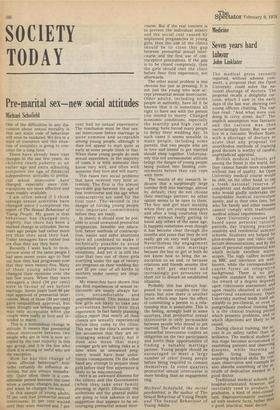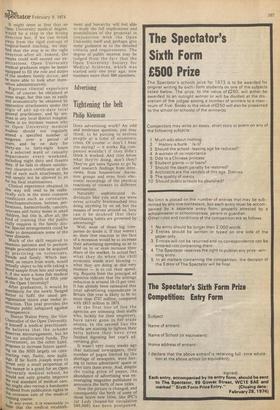Seven years hard labour
John Linklater
The medical press recently reported, without adverse comment, a proposal that the Open University could solve the national shortage of doctors. The proposal recalls a delightful cartoon, which I saw in the early days of the last war, showing two young officers chatting. The caption read: "And what were you doing in civvy street, doc?" The implicit assumption was fantastic and the cartoon was then excruciatingly funny. But we now live in a fantastic Welfare State, with a shortage of doctors so acute that any proposal for unorthodox methods of training good doctors is worthy of careful, unprejudiced appraisal.
British medical schools are among the finest in the world, but they cannot handle more students without loss of quality. An Open University medical course would be able, on the other hand, to taco a fresh national reserve of competent and dedicated persons who would gladly undertake the formidable medical curriculum slowly, and in their own time, but who for family and other reasons cannot comply with traditional medical school requirements.
Open University courses are based upon personal tutorial periods, day training practical sessions and residential summer schools. Students are helped bY ultra-modern tape and video tape lecture demonstrations, and by the issue of personal experimental kits which include excellent microscopes. The high calibre lectures on BBC and television are wellknown, while the correspondence course forms an integrative background. There is no prerequisite standard for entry and the award of a degree depends upon continuous assessment and upon results obtained at closely supervised examinations. Open University method lends itself admirably to pre-clinical, or even to postgraduate medical training but it is the clinical training period which presents problems, and to which objections are likely to he raised.
During clinical training, the ac' cent is on safety rather than on brilliance. The medical student at this stage becomes accustomed, to examining patients and observing diseases, while learning t,c) handle living tissues and acquiring technical skills. By con' stant observation and example he also absorbs something of the attitude of dedication needed in 3 good doctor. Traditional medical schools are, hospital-orientated, however, an°, inevitably tend to produce, graduates, a kind of mini-consu!, tant, disproportionately overloan ed with esoteric facts, rather than a good, practical, basic doctor. Spectator ,,pectator February 9, 1974
It might seem at first that an OPen University medical degree, Would be a step in the wrong direction but, if we can break away from the rigid concept of nospital-based teaching, we may find that the step is in the right direction after all. Indeed, the results could well exceed our expectations. Open University medical graduates might be better equipped to fill the role and duties of the modern family doctor, and be more able to look after themselves administratively.
Rigorous clinical experience must, of course, be obtained at some stage, but this can as easily and economically be obtained by apprentice attachments under the aegis of any up-to-date local general practitioner, and by sessions in any local district hospital. There is no intrinsic reason why an open University medical student should not regularly attend a specified number of surgeries over a period of Years, and be on duty for thirty-six to forty-eight hours ,In a selected ward or casualty department every weekend, including night duty and theatre duty. If he fails to obtain satisfactory clearance certificates at the end of each such attachment, he will simply not be allowed to sit for his final examinations.
Clinical experience obtained in tb. is way will tend to be realistically rich in the more common Conditions such as coronaries, bronchopneumonias, hernias, perforations, haemorrhoids, cancers, neuroses and runny noses in small Children, but this is, after all, the kind of training that the public really requires in the family doctor. Special arrangements could be made to demonstrate some of the rarer diseases.
Much of the skill required to examine patients and to perform ,simple procedures can be acquired 0Y practicing on volunteers, friends and family. Which husband, on return from work, would actually object to his wife taking a b,lood sample from him and testing II, if she were a bona fide medical student in her fourth or fifth year at the Open University? After graduation, it would be mandatory for the newly fledged doctor to fulfil the usual preregtstration intern year under instruction. This year provides the nItimate public safeguard against incompetence. Doctor Walter Perry, the Vice-hancellor of the Open University, .r.ls himself a medical practitioner. ,cle believes that the scheme has encouragement, but he gas no unallocated funds. The 'overnment, on the other hand, Proposes to increase future spend'rig on the NHS largely on constructing vast, flashy, new build.Ings. If Sir Keith Joseph were to invest only a small proportion of this money in a grant for an Open university medical school, he Would not only greatly improve 1.11e real standard of medical care, PI. might also recoup a handsome '41Vidend from publication rights in title overseas sale of the medical rattling course. 1. In any event, it is reasonable to "coPe that the medical establish
ment and hierarchy will feel able to study the full implications and possibilities of the proposal in conjunction with the Open University itself and, perhaps, give some guidance as to the detailed criteria and requirements. The degree of public interest may be judged from the fact that the Open University Society for Medical Sciences, which was started only one year ago, now numbers more than 800 members.



































 Previous page
Previous page